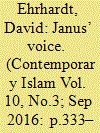|
|
|
Sort Order |
|
|
|
Items / Page
|
|
|
|
|
|
|
| Srl | Item |
| 1 |
ID:
154513


|
|
|
|
|
| Summary/Abstract |
This article shows how bureaucratic discretion in the implementation of Nigeria's power-sharing institutions, the Federal Character, has led to the formalization of local informal norms on belonging. Under the Federal Character, Nigerians have to be ‘indigenes’ to access certain economic and political opportunities at the federal as well as state and local government levels. However, what makes a person indigenous is not formally defined, leaving street-level officials free to decide how to allocate indigeneship certificates. Using original qualitative and quantitative data on Kano, northern Nigeria's largest city, this article shows that local officials faced with this discretion often turn to locally salient norms on belonging. In Kano, several of these norms set ethnic and religious criteria for belonging, particularly those that prioritize the rights of the ‘native’ over those of the citizen. The article demonstrates how street-level bureaucrats use these ethnic and religious criteria to allocate indigeneship certificates, prioritizing Kano's ‘natives’ over other Nigerian citizens. This dynamic may be mirrored across Nigeria, depending on the norms on belonging that are locally salient. While the article suggests a simple technical solution – formally defining indigeneship on the basis of residence – it also shows the deep political barriers to its implementation.
|
|
|
|
|
|
|
|
|
|
|
|
|
|
|
|
| 2 |
ID:
148227


|
|
|
|
|
| Summary/Abstract |
This article analyses the role of religious leaders in collective violence in Kano, the major urban centre in northern Nigeria. It compares two episodes of collective action in the city—the violent ‘Plateau riots’ in 2004 and the non-violent ‘cartoon protests’ in 2006—to explore the role of religious leaders in the variation in violence between the two events. The core argument is that the ways in which Islamic and Christian preachers framed the triggering events for these cases facilitated different forms of mobilisation and enemy identification in response. In 2004, the interpretation of violence in Plateau State through the ‘Christians-versus-Muslims’ frame allowed for mobilisation within Kano’s Christian and Muslim communities as well as for the identification of local Christians as enemies. In 2006, in contrast, the infamous Danish cartoons were actively framed as part of the global struggle between faithful Nigerians and nonreligious Westerners, facilitating non-violent mobilisation across Christian-Muslim boundaries. Thus, the divergent discursive strategies employed by religious leaders are likely to have contributed to violent escalation in 2004 and to peaceful mobilisation in 2006. At the same time, however, the article emphasises the interaction of discursive framing with other factors, such as the role of security forces and the inextricable connections between religious and political authorities in Kano. The article is based on mixed-methods data collected in Kano between 2006 and 2012, including perceptions survey data, semi-structured interviews, and newspaper articles.
|
|
|
|
|
|
|
|
|
|
|
|
|
|
|
|
|
|
|
|
|